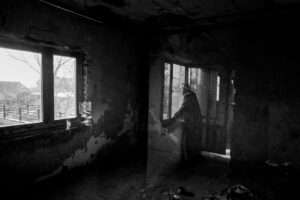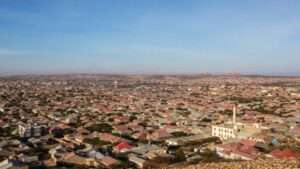Nina Strochlic
Washington, D.C.
- 2020

Fellowship Title:
- "Papers Without a Country: The World’s Forgotten Archives"
Fellowship Year:
- 2020

In Kosovo, War Survivors Turned Homes Into Their Own Museums
This article, by APF fellow Nina Strochlic, first appeared in the Washington Post on February 21, 2024. It was supported by her research for her APF fellowship. POKLEK, Kosovo — Fadil Muqolli has spent more than two decades trying to rebuild his life. He remarried, raised two sons. “My new family,” he calls them. But there is no escaping his past when he lives a short walk from its charred remains. Across the former Yugoslavia, poignant museums commemorate the wars sparked during the splintering of the six republics and two autonomous regions once held together by a fragile socialist bond. Bosnia has at least five museums about the war; Croatia has three. Serbia has one. Kosovo has none. Earlier this year, nearly 25 years after war ended, the Ministry of Culture announced plans to develop one. For now, the history is preserved in privately owned sites, like the ruins of the home where Muqolli’s first family once lived. As memories fade, evidence of the war has survived only because Muqolli and other Kosovars safeguard it.

A Country Shaped By Poetry
This article, by APF fellow Nina Strochlic, first appeared in the Noēma Magazine on February 21, 2024. It was supported by her research for her APF fellowship. Hargeysa, the capital city of Somaliland. (Mustafa Saeed/Noema Magazine) Somaliland’s poets have toppled governments and ushered in peace. It was a dark February evening when a young Somali math professor posted a poem on his Facebook page. In keeping with the tradition of his ancestors, who maintained an oral culture until only recently, he spoke it aloud in a rhythmic cadence: “When I realizedthere is neitherwells dug for you,nor rescuers on the wayand the leaders elected to serve the nation have corrupted the resources;” Then he uploaded the recording to his profile. In Somaliland, poems were often recited to pass the time by men leading camel trains and by women weaving mats to cover their domed huts. Like the lives of the nomadic people who spoke them, the poems were cyclical. When their speakers moved, they brought their animals and their poetry. At each stop along this annual
